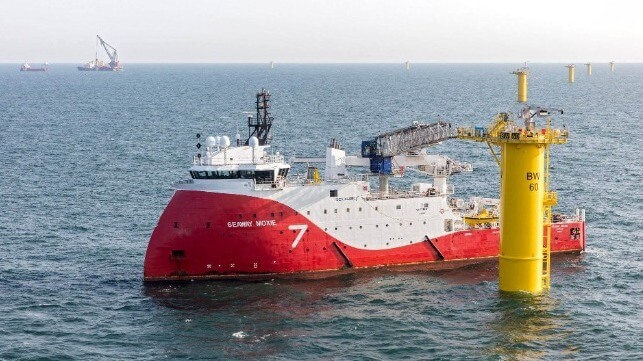Subsea 7 Reacquires Renewables Business After Disappointing Results

Less than two years after spinning out its renewables business unit in a merger with OHT to create a pure-play renewables company offering installation services for offshore wind, Subsea 7 announced it has agreed to re-acquire the business after disappointing results from Seaway 7. Under the terms of the agreement, the former shareholders of OHT, including Arne Blystad’s Songa Capital, Knudsen family’s West Coast Invest, and Lotus Marine, will exchange their interest in Seaway 7 for Subsea 7.
The transaction is valued at approximately $111 million. Kristian Siem’s Subsea 7 currently owns over 72 percent of the shares in Seaway 7. The agreement is for 21.5 percent of the company giving them a total of nearly 94 percent of the stock with plans to start a voluntary offer for the remaining shares. Seaway 7 notes, however, that it is in a position to effect a compulsory acquisition of the remaining shares. Ultimately they will effect the compulsory acquisition and apply to delist Seaway 7 from the Euronex Growth Oslo excahnge. The transaction will be effected through a share exchange at a ratio of one share of Subsea 7 for each 22 shares of Seaway 7. OHT’s former investors will collectively hold less than three percent of Subsea 7 after the transaction.
When the merger was announced in 2021, the two companies cited the expected strong demand for the services of contractors as the offshore wind industry pursues its projected high growth. The companies said that while the foundation installation market was competitive, the markets for cable laying and turbine installation were more favorable and installation capacity in all markets was expected to be absorbed by 2025. They highlighted the long-term opportunities beyond 2025.
The new Seaway 7 company was positioned to offer a full range of transport and installation services combining the installation of turbines, foundations, substations, and cables. They were also expecting the delivery of two new vessels from China as well as the OHT’s existing fleet of five heavy transportation vessels and the renewables business unit’s long track record in offshore wind installation projects. It also had a fleet of two heavy lift vessels, two cable lay vessels, and an installation support vessel.
Reports indicated that the combination encountered a series of problems. The delivery of the vessels was also delayed with the ships not expected until later this year. Despite revenues of more than $1.1 billion, the company reported a loss for the year of $81 million for 2022 on top of a $63 million loss in 2021. The company reports a backlog of $844 million, half of which was booked in the fourth quarter of 2022.
Discussing 2022 results, Stuart Fitzgerald, Chief Executive Officer, said, “Seaway7 did not perform as expected during 2022. The problems encountered originated from the combination with OHT linked primarily from issues with the construction of Seaway Alfa Lift. Specifically, the design and fabrication of the mission equipment led to an overrun on the vessel construction schedule and budget with a knock-on impact on Dogger Bank A&B, for which a provision was taken in 2022. This development contributed, among other factors, to the group being unable to realize its initial objective to increase the free float of Seaway7, and necessitated recapitalizing Seaway7 through a combination of debt and equity rights issue.”
He continued by saying that in recent years the offshore fixed wind contracting industry has seen a rapid evolution in project and equipment sizes, expansion into new geographies, and generally onerous contracting and commercial terms. The result has been, that despite many examples of strong delivery across individual projects, the overall financial performance of Seaway7 and a number of its peer companies has shown inadequate returns on the capital being deployed.
Citing a tight supply in their markets and strong bidding activity with clients seeking to secure capacity for 2026 and beyond, Seaway 7 told investors during today’s year-end report that it believed it was well positioned for the future. However, they said that the delivery of significant earnings growth would be in the medium and longer term.
Subsea 7 did not publicly comment on the reasons for the decision to take full ownership of the company, but they told shareholders in their year-end report also provided today that they were building strong momentum. They said the recovery in its subsea market gathered pace in 2022 and predicted that revenue and adjusted EBITDA in 2023 would be higher than in 2022, with a weighting towards the second half of the year.
Subsea 7 also said working with Siem Offshore and Kongsberg Maritime they were exploring steps required to optimize marine operations for floating wind projects. The company continues to believe strongly in emerging opportunities in the offshore wind sector.
